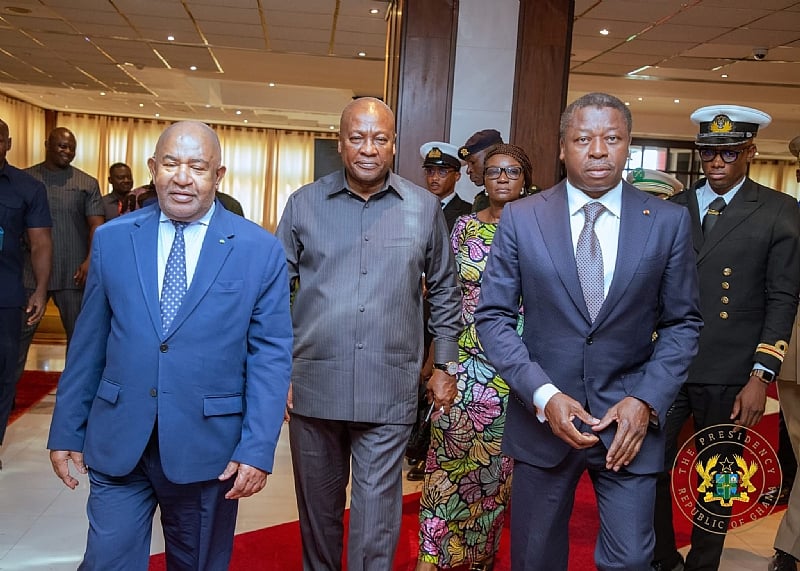The Africa Prosperity Dialogues 2025, hosted in Accra, Ghana, served as a pivotal platform for African leaders to deliberate on strategies for achieving sustainable economic growth and deeper regional integration. President John Dramani Mahama of Ghana expressed his deep appreciation for the valuable contributions of President Azali Assoumani of Comoros and President Faure Gnassingbé of Togo during the presidential session of the dialogues. Mahama underscored the critical importance of robust leadership and unwavering commitment in driving Africa towards its shared vision of economic transformation. He emphasized that collaborative efforts with the private sector, coupled with diligent work, are essential to realizing the dream of an industrialized and inclusive Africa. The dialogues centered on key priorities such as bolstering effective governance, developing crucial infrastructure, and fostering industrialization across the continent.
The vision of a prosperous and industrialized Africa requires a multifaceted approach, beginning with strong governance structures. Effective governance ensures transparency, accountability, and the rule of law, creating a stable and predictable environment that attracts investment and fosters economic growth. This includes combating corruption, strengthening institutions, and promoting good governance practices at all levels. Coupled with good governance, investment in infrastructure is paramount. This encompasses developing robust transportation networks, reliable energy systems, and advanced communication infrastructure to facilitate trade, connect markets, and enhance productivity. Strategic infrastructure development lays the foundation for industrialization and economic diversification, enabling African nations to add value to their resources and participate more effectively in global value chains.
Industrialization is the engine of economic transformation, allowing African nations to move beyond reliance on raw material exports and create value-added products. This involves developing manufacturing capabilities, promoting technological innovation, and supporting the growth of small and medium-sized enterprises (SMEs). Industrialization creates jobs, increases incomes, and strengthens domestic economies, paving the way for a more prosperous and resilient future. The African Continental Free Trade Area (AfCFTA) plays a crucial role in accelerating industrialization by creating a single continental market for goods and services. This fosters competition, encourages specialization, and promotes economies of scale, allowing African businesses to thrive and compete on a global stage.
The AfCFTA serves as a cornerstone of Africa’s economic integration efforts. By eliminating tariffs and non-tariff barriers, the AfCFTA stimulates intra-African trade, boosts investment, and strengthens regional value chains. This creates opportunities for businesses to expand their markets, access a wider range of inputs, and increase their competitiveness. Harnessing the full potential of the AfCFTA requires continued efforts to simplify trade procedures, harmonize regulations, and address infrastructure bottlenecks. This includes investing in trade facilitation measures, establishing efficient customs procedures, and promoting cross-border cooperation to reduce trade costs and enhance the flow of goods and services across the continent.
Realizing the vision of an industrialized and inclusive Africa requires sustained collaboration between governments, the private sector, and civil society. Governments must create an enabling environment for businesses to thrive, while the private sector plays a crucial role in driving innovation, creating jobs, and investing in productive capacity. Civil society organizations contribute by promoting good governance, advocating for inclusive policies, and empowering local communities. This collaborative approach ensures that the benefits of economic growth are shared widely and that no one is left behind. Investing in human capital, particularly education and skills development, is essential for empowering future generations and equipping them with the tools they need to succeed in a rapidly changing global economy.
President Mahama’s remarks at the Africa Prosperity Dialogues 2025 reaffirm his commitment to Africa’s economic transformation and the empowerment of its people. He emphasized that achieving this vision requires dedicated effort, strategic partnerships, and a shared commitment to building a prosperous and inclusive future for all Africans. The dialogues served as a crucial forum for leaders to share best practices, exchange ideas, and forge stronger partnerships to accelerate Africa’s journey towards sustainable development. The discussions and commitments made at the dialogues lay the groundwork for a more prosperous and integrated Africa, where economic growth is inclusive and benefits all its citizens.


